Probiotic for Gut Health
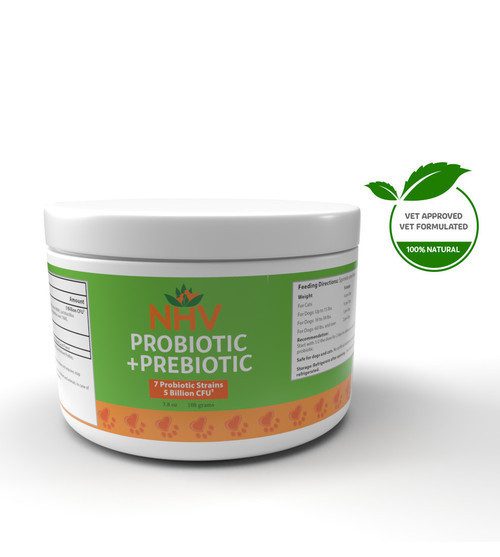
free shipping over $100 (USA & Canada)
1-877-937-4372 the pet expert hotline
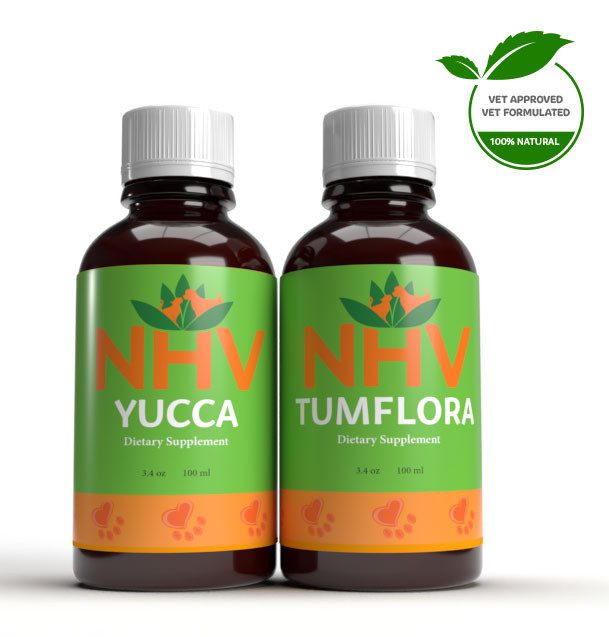
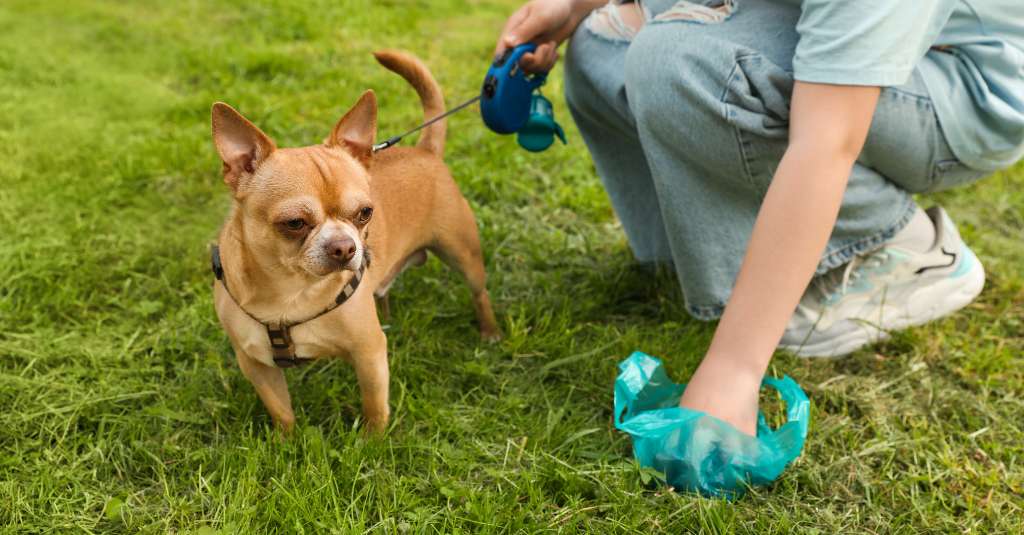
Oh no, why does my pet’s litter box situation seem…off? Our furriends can’t exactly tell us when their tummy isn’t feeling right. But luckily, they do leave us with some clues: their poop! While scooping duty might not be glamorous, irregular stools, whether diarrhea (loose, watery stools) or constipation (hard, dry stools), can give you valuable insights into their health.
There are two forms of irregular stool – diarrhea and constipation – that are very common in dogs and cats.
Diarrhea occurs when fecal material moves rapidly through the intestines, leading to reduced absorption of water, nutrients, and electrolytes.
Common diarrhea causes:
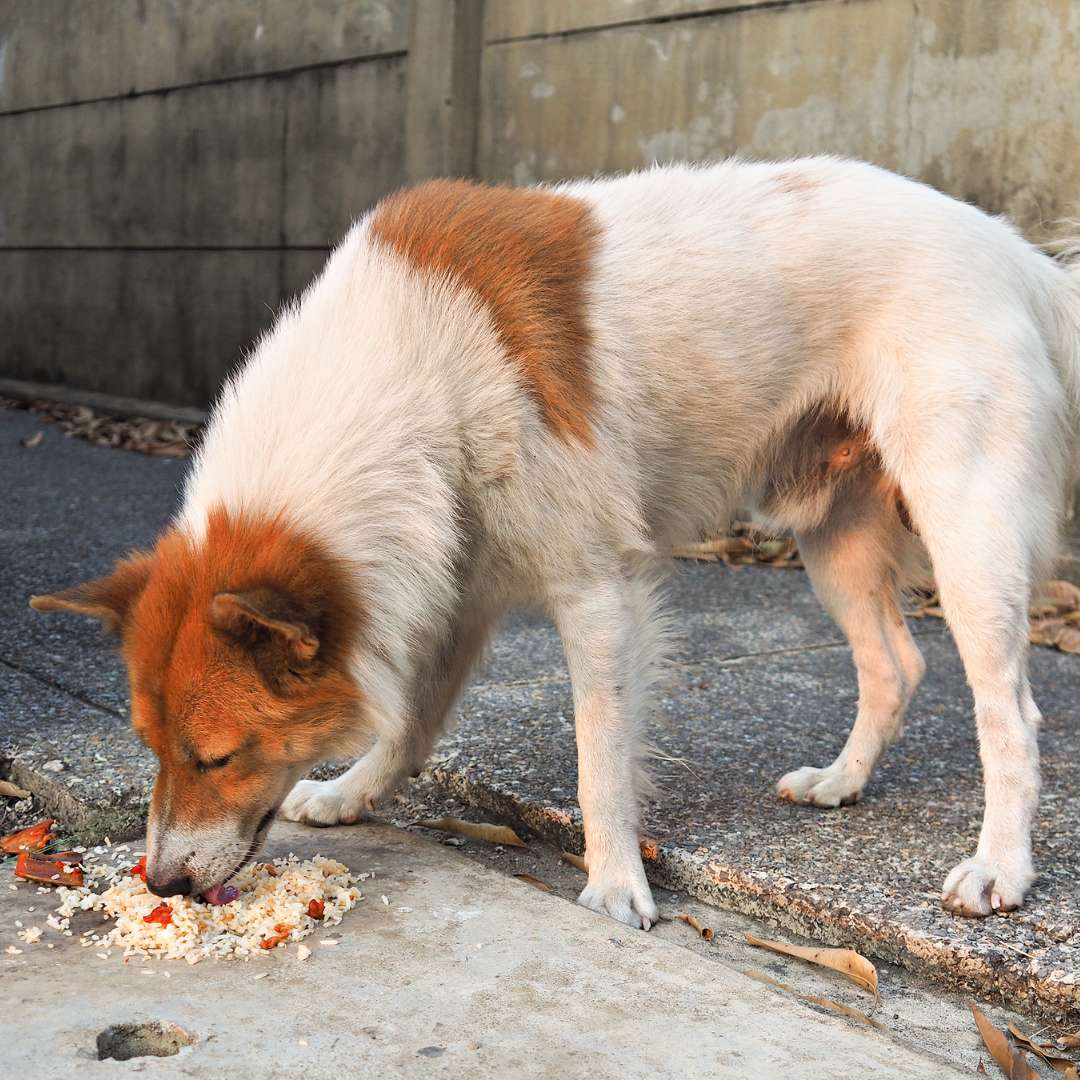
Constipation is characterized by infrequent or difficult passage of stool or feces and is often a temporary condition. Pups and kitties experiencing constipation may exhibit signs of straining or discomfort when trying to defecate.
Common constipation causes:
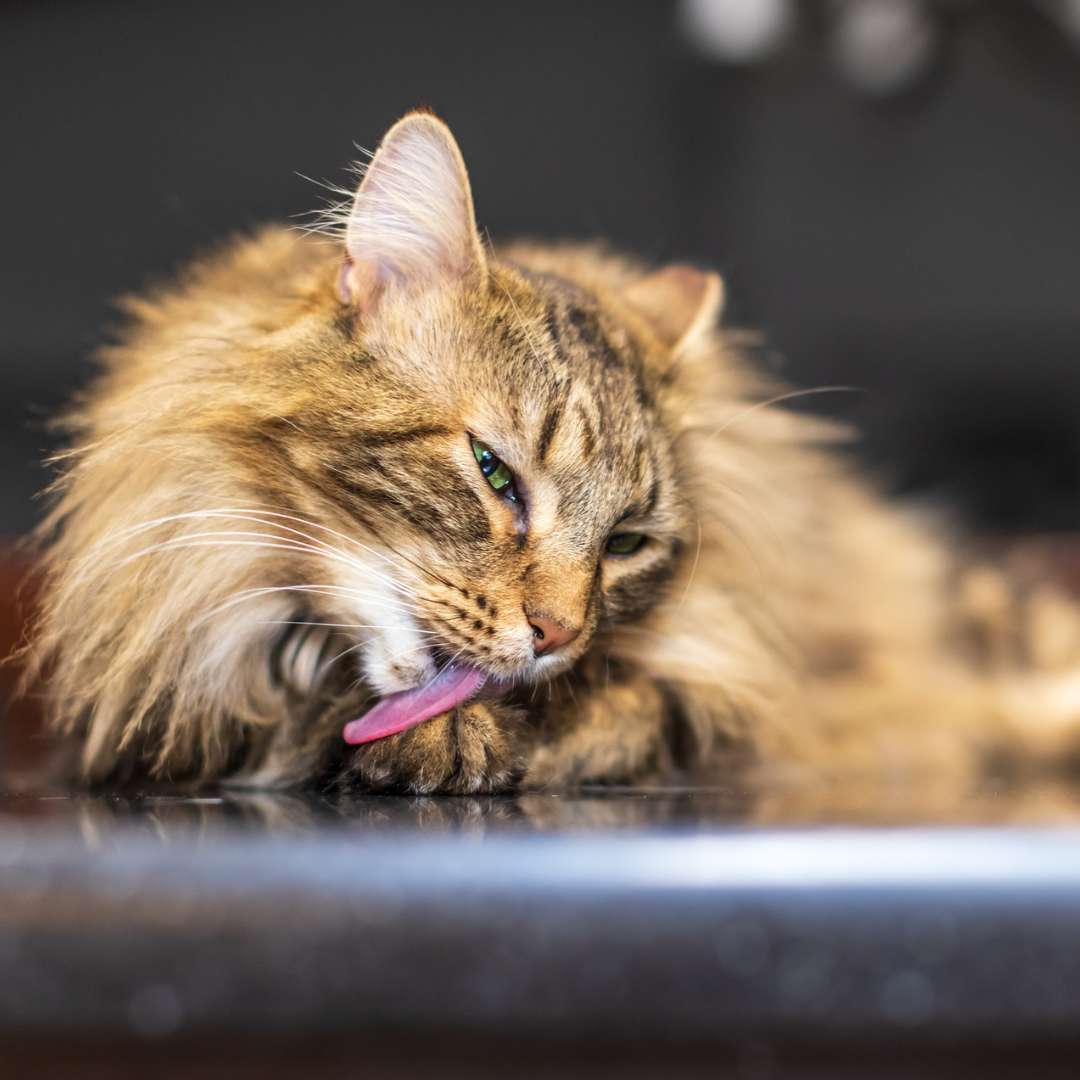
Beyond the common issues of diarrhea and constipation, there are other signs in your pet’s stool that might indicate digestive problems.
Here are some other forms of irregular stools to watch out for:
If your little one’s irregular stools persist for more than a day or two, or are accompanied by other signs like vomiting, consult your veterinarian immediately. Early diagnosis and treatment can make a big difference in their recovery!
As you may have already learned, our furry friends’ poops are very indicative of their digestive health. If they’re experiencing constipation, diarrhea, or other irregularities, it might be time to re-evaluate your gut health.
Diet
Remember: If your little one is straining to defecate and hasn’t pooped in more than a day or two, seek veterinary attention.
What your pet eats is very important when restoring their digestive health. For example, in cases of constipation, we would recommend adjusting the fiber content and quality. High-fiber diets can be beneficial for some pets, while others may respond better to low-fiber diets, depending on the root cause. Increasing water intake by switching to canned food may also be suggested.
As every furkiddo has unique needs, they require different meal plans to address their conditions. Dr. Amanda can help your little one create a tailored nutritional plan to target their health issues!
You may also consider adding probiotic foods (e.g., yogurt, kefir) into your pet’s meal. They can help introduce good bacteria to their gut microbiome.
NHV Herbal Supplements
Apart from adding probiotic foods to their diet, NHV Probiotic + Prebiotic can also be very beneficial! It has of 7 strains of high-quality probiotics, with each scoop containing 5 Billion CFU (Colony Forming Units – the active good bacteria). Our probiotic can help support your little one’s digestive system and addresses gastrointestinal (GI) issues like diarrhea.
In addition to Probiotic supplements, NHV Plantaeris and NHV TumFlora can also help promote overall GI health in your little one. Talk to one of our Pet Experts for supplement recommendation best for your pet!
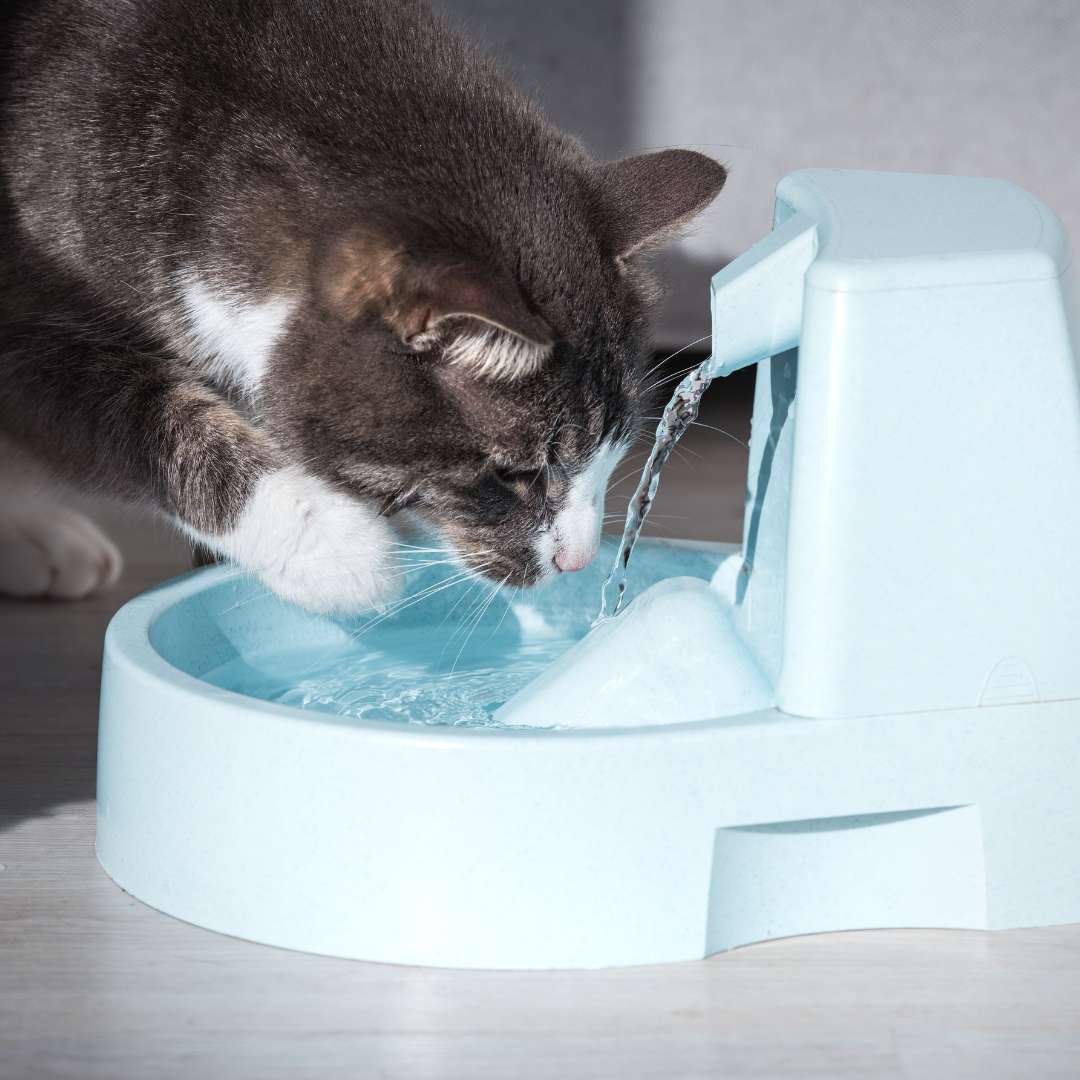
Hydration
Water, WATER Everywhere! Drinking plenty of water throughout the day helps soften stool and keeps things flowing smoothly.
Move Your Body
Regular exercise is just as important for pets as it is for us. Daily walks, playtime, or interactive games can help stimulate the digestive system and promote stool regularity!
By incorporating these tips and monitoring your pet’s stools, you can play a proactive role in safeguarding their gut health and overall well-being. Remember, a happy gut leads to a happy and healthy pet! If you have any questions about irregular stools in pets, feel free to connect with us below!
Probiotic for Gut Health

Vet-formulated. Helps with gut, immune, and anxiety support
buy 2 and save $3
4 month supply for a small to medium size pet.
Did you know your cat’s gut health is a key factor in their overall well-being? NHV Prebiotics + Probiotics for cats may be a valuable addition to your kitty’s regimen because it helps keep the GI tract healthy and, thus, contributes to your kitty’s overall health. The proprietary blend is designed and vet-formulated for your cat’s consumption. It contains 7 strains of human-grade probiotics, and each scoop has 5 Billion CFU (Colony Forming Units - amount of active good bacteria).

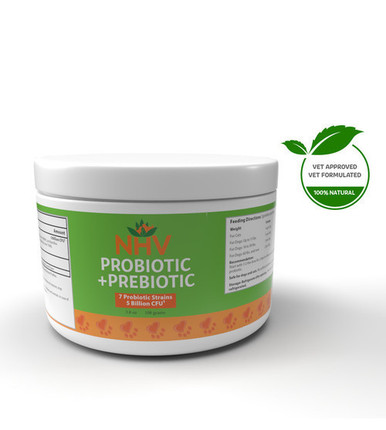
Did you know your cat’s gut health is a key factor in their overall well-being? NHV Prebiotics + Probiotics for cats may be a valuable addition to your kitty’s regimen because it helps keep the GI tract healthy and, thus, contributes to your kitty’s overall health. The proprietary blend is designed and vet-formulated for your cat’s consumption. It contains 7 strains of human-grade probiotics, and each scoop has 5 Billion CFU (Colony Forming Units - amount of active good bacteria).

Addressing potential concerns before they become a problem is always a good idea. As pet parents, the wellness of our sweet furkids is of the highest importance. Even when they don’t have any current health concerns, it's natural for us to seek proactive measures to maintain their optimal health. NHV supplements, like our Probiotics + Prebiotics for cats, may just be what you need.
This formula, containing 7 shelf-stable, soil-based, spore-forming probiotics, helps keep your kitty’s digestive system in tip-top shape. The probiotic strains include Bacillus coagulans LBSC, Bacillus subtilis PLSSC, Bacillus clausii 088AE, Lactobacillus acidophilus 033AE, Lactobacillus plantarum 022AE, Lactobacillus casei 118AE, and Saccharomyces boulardii SBSC.
Probiotics are formed by “good” bacteria and are well-known for improving digestive and cat gut health. These natural ingredients also help other aspects of your pet’s body work well and restore balance.
The live microorganisms, like bacteria and yeast, in probiotics can potentially restore gut microbiota, the natural microorganisms in a healthy gut. These beneficial bacteria are crucial in supporting the digestive tract and addressing digestive problems (e.g., IBS, diarrhea, constipation). Our vet added 7 strains of probiotics (5 Billion CFU per scoop) to help optimize gut health in different ways.
Their ability to add good bacteria to the pet’s body may help improve the immune system. These bacteria act as a defense mechanism against pathogens, potentially preventing the onset of significant diseases.
When the gut is swollen, it can make your cat more anxious or stressed. This happens because there are lots of nerves connecting the gut and the brain. So, a healthy gut is important for a happy and calm kitty.
Unlike probiotics, prebiotics are carbohydrates that induce the growth of good bacteria.
Our probiotic formulation is expertly formulated and has added pumpkin and carrot powder to help enhance absorption.
At NHV, we care. From sourcing and manufacturing to delivering the final products to your doorstep, our team ensures everything is done with the highest quality. What does it mean? It means that our formulations are all backed by research. And none of them contains any artificial additives, preservatives, or coloring. They're GMP-certified full-spectrum extracts made in an FDA-registered facility.
You can read more about how we formulate our products here.
Don’t worry. Even if your kitty is a picky eater, administrating NHV supplements is fairly easy. Since it is liquid-based, you can add the dosage to their daily meal favorite treat or directly squirt it in their cheek pocket.
If you have any questions about our probiotics supplement, your kitty’s gut health, or anything else in the world of pet wellness, please don’t hesitate to reach out!
Order NHV Prebiotics & Probiotics for Cats now to support your beloved sweetie’s health!
If your kitty is struggling with GI issues, you may also consider our TumFlora for Cats to help improve your cat’s natural intestinal flora and ease IBS symptoms.
In addition to natural supplements like ours, some foods contain rich probiotics. For example, plain, low-fat yogurt and fermented vegetables like kimchi are both recommended as probiotic-filled foods. However, before making any changes to your furkid’s diet, please remember to consult a vet first.
Probiotics
Prebiotics
Inactive Ingredients: Improve supplement absorption
For dogs: by weight
For cats: ¼ scoop per day. (SIX months supply)
How to Administer
Sprinkle over food. It is recommended to start with HALF the dose for 2 days to allow your little one to acclimate to the probiotic.
Product Storage
All NHV Natural Pet Products contain no artificial additives, preservatives, or chemicals. The shelf life after opening is SIX months, and must be refrigerated after opening.
Cautions and Contraindications: Do not use in pregnant or nursing animals. Speak to your vet before using our products. A second visit is recommended if your pet’s condition does not improve, or deteriorates after continued use of the supplements.
Addressing potential concerns before they become a problem is always a good idea. As pet parents, the wellness of our sweet furkids is of the highest importance. Even when they don’t have any current health concerns, it's natural for us to seek proactive measures to maintain their optimal health. NHV supplements, like our Probiotics + Prebiotics for cats, may just be what you need.
This formula, containing 7 shelf-stable, soil-based, spore-forming probiotics, helps keep your kitty’s digestive system in tip-top shape. The probiotic strains include Bacillus coagulans LBSC, Bacillus subtilis PLSSC, Bacillus clausii 088AE, Lactobacillus acidophilus 033AE, Lactobacillus plantarum 022AE, Lactobacillus casei 118AE, and Saccharomyces boulardii SBSC.
Probiotics are formed by “good” bacteria and are well-known for improving digestive and cat gut health. These natural ingredients also help other aspects of your pet’s body work well and restore balance.
The live microorganisms, like bacteria and yeast, in probiotics can potentially restore gut microbiota, the natural microorganisms in a healthy gut. These beneficial bacteria are crucial in supporting the digestive tract and addressing digestive problems (e.g., IBS, diarrhea, constipation). Our vet added 7 strains of probiotics (5 Billion CFU per scoop) to help optimize gut health in different ways.
Their ability to add good bacteria to the pet’s body may help improve the immune system. These bacteria act as a defense mechanism against pathogens, potentially preventing the onset of significant diseases.
When the gut is swollen, it can make your cat more anxious or stressed. This happens because there are lots of nerves connecting the gut and the brain. So, a healthy gut is important for a happy and calm kitty.
Unlike probiotics, prebiotics are carbohydrates that induce the growth of good bacteria.
Our probiotic formulation is expertly formulated and has added pumpkin and carrot powder to help enhance absorption.
At NHV, we care. From sourcing and manufacturing to delivering the final products to your doorstep, our team ensures everything is done with the highest quality. What does it mean? It means that our formulations are all backed by research. And none of them contains any artificial additives, preservatives, or coloring. They're GMP-certified full-spectrum extracts made in an FDA-registered facility.
You can read more about how we formulate our products here.
Don’t worry. Even if your kitty is a picky eater, administrating NHV supplements is fairly easy. Since it is liquid-based, you can add the dosage to their daily meal favorite treat or directly squirt it in their cheek pocket.
If you have any questions about our probiotics supplement, your kitty’s gut health, or anything else in the world of pet wellness, please don’t hesitate to reach out!
Order NHV Prebiotics & Probiotics for Cats now to support your beloved sweetie’s health!
If your kitty is struggling with GI issues, you may also consider our TumFlora for Cats to help improve your cat’s natural intestinal flora and ease IBS symptoms.
In addition to natural supplements like ours, some foods contain rich probiotics. For example, plain, low-fat yogurt and fermented vegetables like kimchi are both recommended as probiotic-filled foods. However, before making any changes to your furkid’s diet, please remember to consult a vet first.
Probiotics
Prebiotics
Inactive Ingredients: Improve supplement absorption
For dogs: by weight
For cats: ¼ scoop per day. (SIX months supply)
How to Administer
Sprinkle over food. It is recommended to start with HALF the dose for 2 days to allow your little one to acclimate to the probiotic.
Product Storage
All NHV Natural Pet Products contain no artificial additives, preservatives, or chemicals. The shelf life after opening is SIX months, and must be refrigerated after opening.
Cautions and Contraindications: Do not use in pregnant or nursing animals. Speak to your vet before using our products. A second visit is recommended if your pet’s condition does not improve, or deteriorates after continued use of the supplements.
bowel support for dogs

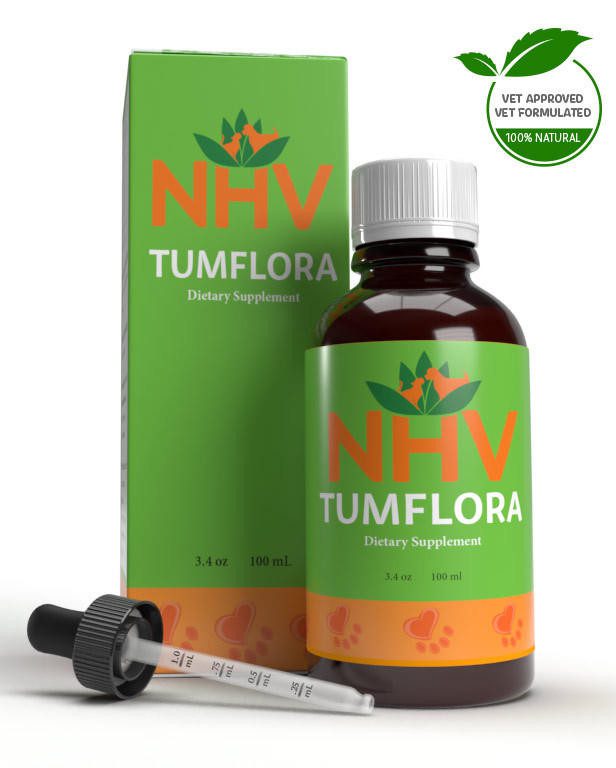
Natural Support for Inflammatory Bowel Disease in Cats
buy 2 and save $3
3 month supply for a small to medium size pet.
If your kitty’s fur is looking dull, they won’t eat their favorite treats and are suffering from vomiting, weight loss, diarrhea, and lethargy, your sweet kitty may have Inflammatory Bowel Disease (IBD in cats). NHV TumFlora can help naturally balance the intestinal flora in your kitty’s body and help maintain a healthy gut. It’s also a great proactive gut supplement for a happy, healthy furbaby.

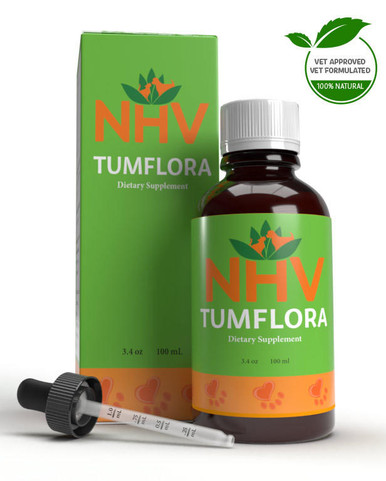
If your kitty’s fur is looking dull, they won’t eat their favorite treats and are suffering from vomiting, weight loss, diarrhea, and lethargy, your sweet kitty may have Inflammatory Bowel Disease (IBD in cats). NHV TumFlora can help naturally balance the intestinal flora in your kitty’s body and help maintain a healthy gut. It’s also a great proactive gut supplement for a happy, healthy furbaby.

Inflammatory Bowel Disease in cats (IBD) is a condition that mainly affects middle-aged to senior kitties, though it can occur at any age. IBD in cats is caused by an inflammatory response to an irritated and inflamed GI tract.
How TumFlora Supports Inflammatory Bowel Disease in Cats
The exact causes of IBD in cats are unknown, however, evidence does suggest that it may arise from an abnormal interaction between bacterial populations in the intestines, diet, a compromised immune system, and other environmental factors as well as genetic abnormalities. TumFlora helps support the body on a variety of levels, which helps address this complex problem.
To help address the imbalance of bacterial populations in the intestines, TumFlora’s blend of herbs work to improve natural intestinal flora. Herbs like licorice and ashwagandha offer support for the immune system, while vitamin and mineral dense herbs like slippery elm and oregon grape help improve nutrient absorption.
In addition to helping with IBD in cats, TumFlora can also help support your kitty if they are suffering from food allergies, gastrointestinal ulcers, and bacterial infections of the gut. Don’t wait for your kitty to have IBD for adding TumFlora, this gentle supplement can be used on a long term proactive basis to support your pet’s gut health.
Inflammatory response thickens the lining of the GI tract, which ends up affecting digestion, absorption of nutrients, and healthy bathroom habits. Cats with Irritable Bowel Disease can experience the following symptoms:
Symptoms of Inflammatory Bowel Disease in Cats
Your veterinarian may recommend treatment for intestinal parasites as well as a combination of medications and diet therapy as a first step. A novel protein, like rabbit or duck, may also be recommended. It takes time and your veterinarian may need to try several different therapies and medications. For a personalized veterinary nutrition plan for your little one, click here.
At NHV, we are a team of holistic veterinarians, pet experts and animal enthusiasts. Get in touch with us if you have any questions or concerns about your pup’s GI tract health or need some extra support.
Made with the finest, organically grown, or ethically harvested herbs. Made specifically for pets, vet-formulated, and vet approved.
Ashwagandha also known as Indian ginseng, is a root that contains a range of beneficial properties including anti-stress and anti-inflammatory action. It also helps defend against microorganisms and balances the immune system.
Boswellia has powerful anti-inflammatory properties and has been used in traditional herbal medicine to treat inflammatory bowel disease.
Chamomile has traditionally been used to help relieve indigestion, expel gas, ease nervous spasms, improve bile flow, and relieve vomiting due to inflammatory bowel disease in cats.
Fennel is an anti-inflammatory, nutritive herb that helps against microorganisms and soothes digestive upset, expels intestinal gas, and relaxes stomach cramps or spasms.
Indian Gooseberry is prized in Ayurvedic medicine for its many health benefits. It may help regulate cholesterol levels, and soothe nausea.
Licorice has been used for centuries for its immunostimulant and anti-inflammatory properties to support against microorganisms, digestion and general well-being. It contains free radical scavengers to help promote healing.
Marshmallow contains demulcent, and diuretic properties. It helps defend against microorganisms, controls bacterial infection, protects the intestinal mucosa, and soothes inflamed mucosa. It has been used in herbalism as a treatment for gastroenteritis.
Oregon Grape contains anti-inflammatory, anti-bacterial, and anti-fungal properties with strong affinities to the liver, digestive system, and mucous membranes.
Slippery Elm contains anti-inflammatory properties and is rich in vitamins and minerals. It is beneficial for gastritis, colitis, duodenal ulcers, and diarrhea.
Select your pet's weight to determine the correct dose.
To be taken twice daily. Determine your pet’s weight and then use the easy chart below to determine the correct dose. This is the minimum dosage.
Pet's Weight Dosage
0 - 15 lb = 0.5 ml
16 - 30 lb = 1.0 ml
31 - 45 lb = 1.5 ml
46 - 60 lb = 2.0 ml
61 - 75 lb = 2.5 ml
Over 75 lb = 3.0 ml
How to Administer
Shake well before use. The easiest method is to use the dropper provide and places the drops into your pet’s food or favorite treat. You can also use the dropper and squirt directly into the pet’s mouth.
Some pets can be finicky, if this occurs consider hiding the drops in foods most pet’s love such as fish, chicken or yogurt or a favorite treat. If your pet only eats dry food then soak a few kibbles at feeding time.
For Best Results
Herbal dietary supplements are beneficial to the health and wellbeing of your pet and are safe for long-term use. Every pet responds to natural herbal supplements differently, therefore it is important to be consistent and administer the product daily. Supplements generally take two to four weeks to take effect, however this will vary from one animal to the next.
Product Storage
All NHV Natural Pet Products are pure herbal extracts and contain no artificial additives, preservatives or coloring. Shelf life after opening is 6 months and must be refrigerated after opening.
Cautions and Contraindications: Do not use TumFlora in pregnant or nursing animals. Speak to your vet before using our products. A second visit is recommended if your pet’s condition does not improve, or deteriorates after continued use of the supplements.
Inflammatory Bowel Disease in cats (IBD) is a condition that mainly affects middle-aged to senior kitties, though it can occur at any age. IBD in cats is caused by an inflammatory response to an irritated and inflamed GI tract.
How TumFlora Supports Inflammatory Bowel Disease in Cats
The exact causes of IBD in cats are unknown, however, evidence does suggest that it may arise from an abnormal interaction between bacterial populations in the intestines, diet, a compromised immune system, and other environmental factors as well as genetic abnormalities. TumFlora helps support the body on a variety of levels, which helps address this complex problem.
To help address the imbalance of bacterial populations in the intestines, TumFlora’s blend of herbs work to improve natural intestinal flora. Herbs like licorice and ashwagandha offer support for the immune system, while vitamin and mineral dense herbs like slippery elm and oregon grape help improve nutrient absorption.
In addition to helping with IBD in cats, TumFlora can also help support your kitty if they are suffering from food allergies, gastrointestinal ulcers, and bacterial infections of the gut. Don’t wait for your kitty to have IBD for adding TumFlora, this gentle supplement can be used on a long term proactive basis to support your pet’s gut health.
Inflammatory response thickens the lining of the GI tract, which ends up affecting digestion, absorption of nutrients, and healthy bathroom habits. Cats with Irritable Bowel Disease can experience the following symptoms:
Symptoms of Inflammatory Bowel Disease in Cats
Your veterinarian may recommend treatment for intestinal parasites as well as a combination of medications and diet therapy as a first step. A novel protein, like rabbit or duck, may also be recommended. It takes time and your veterinarian may need to try several different therapies and medications. For a personalized veterinary nutrition plan for your little one, click here.
At NHV, we are a team of holistic veterinarians, pet experts and animal enthusiasts. Get in touch with us if you have any questions or concerns about your pup’s GI tract health or need some extra support.
Made with the finest, organically grown, or ethically harvested herbs. Made specifically for pets, vet-formulated, and vet approved.
Ashwagandha also known as Indian ginseng, is a root that contains a range of beneficial properties including anti-stress and anti-inflammatory action. It also helps defend against microorganisms and balances the immune system.
Boswellia has powerful anti-inflammatory properties and has been used in traditional herbal medicine to treat inflammatory bowel disease.
Chamomile has traditionally been used to help relieve indigestion, expel gas, ease nervous spasms, improve bile flow, and relieve vomiting due to inflammatory bowel disease in cats.
Fennel is an anti-inflammatory, nutritive herb that helps against microorganisms and soothes digestive upset, expels intestinal gas, and relaxes stomach cramps or spasms.
Indian Gooseberry is prized in Ayurvedic medicine for its many health benefits. It may help regulate cholesterol levels, and soothe nausea.
Licorice has been used for centuries for its immunostimulant and anti-inflammatory properties to support against microorganisms, digestion and general well-being. It contains free radical scavengers to help promote healing.
Marshmallow contains demulcent, and diuretic properties. It helps defend against microorganisms, controls bacterial infection, protects the intestinal mucosa, and soothes inflamed mucosa. It has been used in herbalism as a treatment for gastroenteritis.
Oregon Grape contains anti-inflammatory, anti-bacterial, and anti-fungal properties with strong affinities to the liver, digestive system, and mucous membranes.
Slippery Elm contains anti-inflammatory properties and is rich in vitamins and minerals. It is beneficial for gastritis, colitis, duodenal ulcers, and diarrhea.
Select your pet's weight to determine the correct dose.
To be taken twice daily. Determine your pet’s weight and then use the easy chart below to determine the correct dose. This is the minimum dosage.
Pet's Weight Dosage
0 - 15 lb = 0.5 ml
16 - 30 lb = 1.0 ml
31 - 45 lb = 1.5 ml
46 - 60 lb = 2.0 ml
61 - 75 lb = 2.5 ml
Over 75 lb = 3.0 ml
How to Administer
Shake well before use. The easiest method is to use the dropper provide and places the drops into your pet’s food or favorite treat. You can also use the dropper and squirt directly into the pet’s mouth.
Some pets can be finicky, if this occurs consider hiding the drops in foods most pet’s love such as fish, chicken or yogurt or a favorite treat. If your pet only eats dry food then soak a few kibbles at feeding time.
For Best Results
Herbal dietary supplements are beneficial to the health and wellbeing of your pet and are safe for long-term use. Every pet responds to natural herbal supplements differently, therefore it is important to be consistent and administer the product daily. Supplements generally take two to four weeks to take effect, however this will vary from one animal to the next.
Product Storage
All NHV Natural Pet Products are pure herbal extracts and contain no artificial additives, preservatives or coloring. Shelf life after opening is 6 months and must be refrigerated after opening.
Cautions and Contraindications: Do not use TumFlora in pregnant or nursing animals. Speak to your vet before using our products. A second visit is recommended if your pet’s condition does not improve, or deteriorates after continued use of the supplements.
ibd and diarrhea support

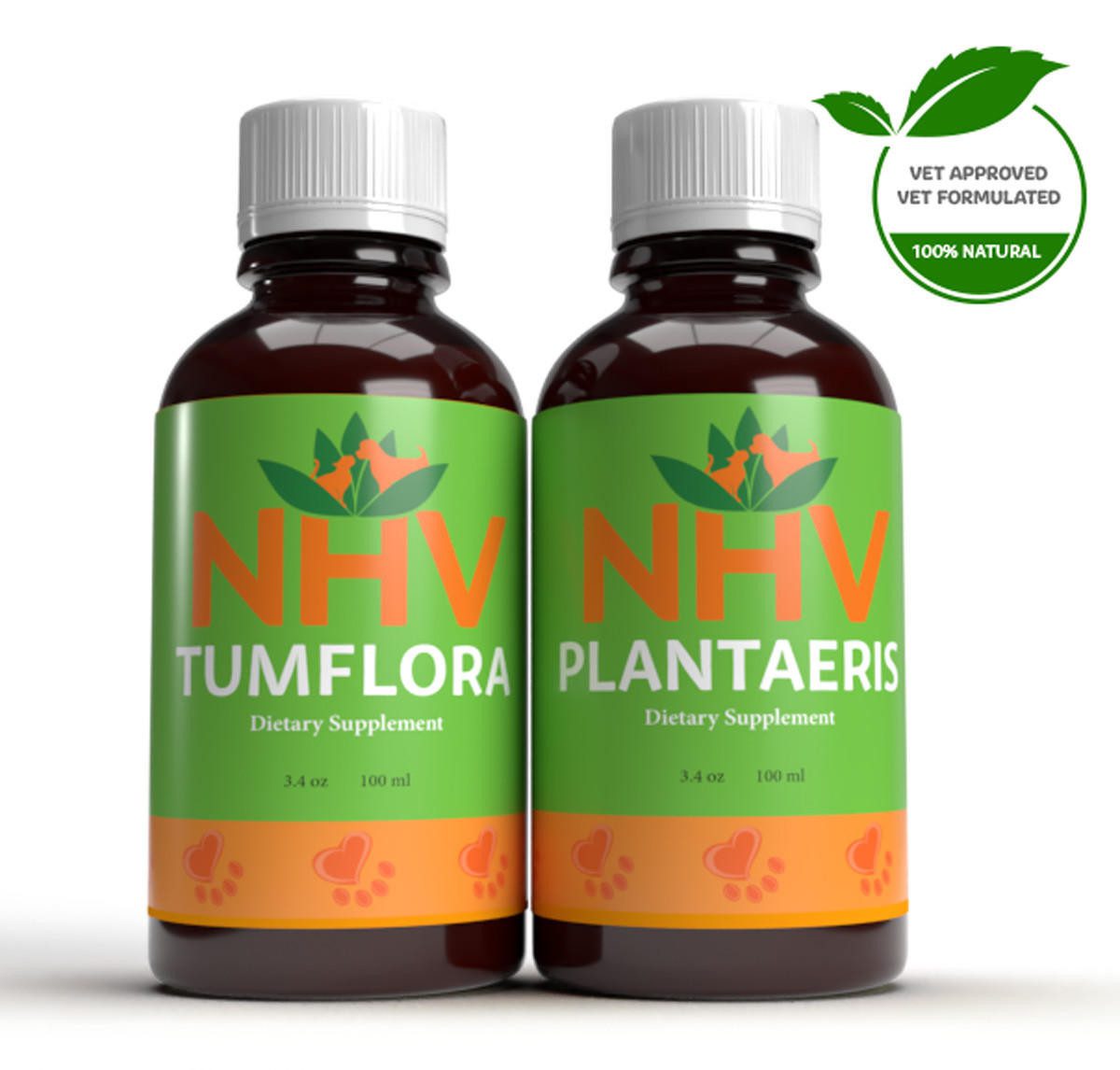
TumFlora & Plantaeris
bundle and save with pet expert kits
3 month supply for a small to medium size
Is your pet losing weight, feeling lethargic, or having irregular bathroom habits? They may be suffering from a common gastrointestinal issue known as Inflammatory Bowel Disease (IBD). Our vet-formulated IBD and Diarrhea Super Support Kit contains a blend of natural ingredients known to help soothe the GI tract and help relieve symptoms like nausea, cramping, and watery stools in pets.

Is your pet losing weight, feeling lethargic, or having irregular bathroom habits? They may be suffering from a common gastrointestinal issue known as Inflammatory Bowel Disease (IBD). Our vet-formulated IBD and Diarrhea Super Support Kit contains a blend of natural ingredients known to help soothe the GI tract and help relieve symptoms like nausea, cramping, and watery stools in pets.
Natural Remedies for Inflammatory Bowel Disease in Dogs and Cats with Additional Diarrhea Support
Typically with inflammatory bowel disease in dogs and cats, your vet will likely recommend a change in diet (since the underlying cause may be related to food allergies). They may prescribe medications and possible nutritional therapy. Our IBD and Diarrhea Super Support Kit contains TumFlora and Plantaeris. These two formulations work together to promote gut health and effective digestion, as well as ease common symptoms of IBD in pets like diarrhea and cramping. Both natural IBD supplements can be taken alongside vet-prescribed medications (though we do recommend spacing the supplements and medication by 2 hours to be easier on your little one).
If you are interested in a gut-friendly nutrition plan, or inflammatory bowel disease diet recommendations for dogs, NHV’s in-house vet Dr. Amanda can work with you to create a personalized plan for your pet's unique needs.
Pets may occasionally experience diarrhea or an upset tummy because maybe they ate too quickly, not enough, or something didn't quite sit right. But consistent runny poos are an alarm bell that something is going on with their digestive health.
TumFlora : contains ingredients like chamomile, licorice root, and ashwagandha, which have been used for centuries to help ease indigestion, muscle cramping and inflammation in the intestinal tract. This balanced IBD pet supplement also contains herbs like Indian gooseberry and fennel seed which may help reduce nausea and encourage healthy movement through the bowels. TumFlora also helps naturally balance intestinal gut flora and can be used alongside probiotics for dogs or cats.
Plantaeris: contains a blend of herbs that work gently and quickly to help alleviate diarrhea and loose stools. Herbs like barberry and bayberry contain soothing properties to help control diarrhea-causing bacteria and control infection. This blend is well-balanced with ingredients like myrrh, and thyme, which may help to expel gas and may promote healing and relief for overall digestive discomfort.
When your furkiddo has IBD, inflammatory cells invade the gastrointestinal tract of your pet, which encompasses the stomach, small, and large intestine. Once inflammatory cells start taking over the GI tract, the intestinal wall may thicken over time and disrupt the absorption and movement of food. It’s unclear what may cause IBD in dogs, cats or other pets, but some potential causes are food allergies, parasites, and autoimmune conditions. A fairly common symptom of IBD in dogs and cats is diarrhea because the GI tract is damaged, so food may not be fully digested or eliminated. If we are to use a simple analogy, pets with inflammatory bowel disease can have diarrhea that may range from a soft-serve ice cream consistency to pretty much like clear water.
Having a healthy pet means the world to us at NHV. Providing your furkiddo with natural support for their digestion and gastrointestinal tract can help improve their quality of life and promote vitality! Apart from adding supplements to their daily care plan, learn more about what you can do to help your pet with IBD here.
Select your pet's weight to determine the correct dose.
Made with the finest, organically grown, or ethically harvested herbs. Made specifically for pets, vet-formulated, and vet approved.
Ashwagandha has been used for over millennia in Ayurvedic medicine for its anti-inflammatory, antibacterial and restorative properties.
Boswellia is beneficial for ringworm, diarrhea, liver issues. Studies are also showing promising results when used for easing symptoms of IBD and asthma.
Chamomile has soothing properties to help expel gas and reduce vomiting caused by IBD. Its sedative and calming properties are helpful for digestive issues like IBD in dogs and cats.
Fennel has anti-inflammatory and carminative properties that help to relax spasms, and help relieve cramping as well as encourage healthy appetite.
Indian Gooseberry has a long history of use in Ayurveda for a range of issues, including easing diarrhea, nausea and heartburn.
Licorice is an herb with an affinity for the digestive, respiratory, and endocrine systems. Its anti-inflammatory properties help to ease tissue damage, relieve flatulence and help to decrease bloating.
Marshmallow is a soothing herb whose anti-inflammatory properties are beneficial support for GI tract conditions like inflammatory bowel disease in dogs and other pets, gastroenteritis, ulcerative colitis, enteritis are more.
Oregon Grape acts as a mild diuretic and laxative to help ease indigestion. It also contains anti-fungal and antibacterial properties to help eliminate infections.
Slippery Elm contains a range of beneficial nutrients that may help decrease symptoms of diarrhea, colitis and gastritis.
Barberry has a long history of use for soothing inflammation, easing diarrhea, and helping to eliminate infections in the intestines.
Bayberry contains tannins, resins, and gums that are effective at fighting bacterial infections and aiding with diarrhea.
Chamomile has been used for centuries as a digestive tonic to soothe digestive discomfort and encourage healing.
Chinese Peony contains healing properties to help relax muscle spasms and stomach discomfort.
Ginger is rich in enzymes that encourage digestion, circulation and improve intestinal muscle tone.
Mullein is an herb known to help soothe and lubricate the GI tract, as well as help to relieve diarrhea and cramps.
Myrrh is rich in anti-inflammatory and antioxidant properties which offer relief for overall digestive discomfort and add immune support.
Oregon Grape is beneficial for stimulating bile flow (may improve digestion) encourage the digestion of nutrients.
Thyme is beneficial for helping to relieve intestinal gas and for expelling foreign bodies such as parasites
Natural Remedies for Inflammatory Bowel Disease in Dogs and Cats with Additional Diarrhea Support
Typically with inflammatory bowel disease in dogs and cats, your vet will likely recommend a change in diet (since the underlying cause may be related to food allergies). They may prescribe medications and possible nutritional therapy. Our IBD and Diarrhea Super Support Kit contains TumFlora and Plantaeris. These two formulations work together to promote gut health and effective digestion, as well as ease common symptoms of IBD in pets like diarrhea and cramping. Both natural IBD supplements can be taken alongside vet-prescribed medications (though we do recommend spacing the supplements and medication by 2 hours to be easier on your little one).
If you are interested in a gut-friendly nutrition plan, or inflammatory bowel disease diet recommendations for dogs, NHV’s in-house vet Dr. Amanda can work with you to create a personalized plan for your pet's unique needs.
Pets may occasionally experience diarrhea or an upset tummy because maybe they ate too quickly, not enough, or something didn't quite sit right. But consistent runny poos are an alarm bell that something is going on with their digestive health.
TumFlora : contains ingredients like chamomile, licorice root, and ashwagandha, which have been used for centuries to help ease indigestion, muscle cramping and inflammation in the intestinal tract. This balanced IBD pet supplement also contains herbs like Indian gooseberry and fennel seed which may help reduce nausea and encourage healthy movement through the bowels. TumFlora also helps naturally balance intestinal gut flora and can be used alongside probiotics for dogs or cats.
Plantaeris: contains a blend of herbs that work gently and quickly to help alleviate diarrhea and loose stools. Herbs like barberry and bayberry contain soothing properties to help control diarrhea-causing bacteria and control infection. This blend is well-balanced with ingredients like myrrh, and thyme, which may help to expel gas and may promote healing and relief for overall digestive discomfort.
When your furkiddo has IBD, inflammatory cells invade the gastrointestinal tract of your pet, which encompasses the stomach, small, and large intestine. Once inflammatory cells start taking over the GI tract, the intestinal wall may thicken over time and disrupt the absorption and movement of food. It’s unclear what may cause IBD in dogs, cats or other pets, but some potential causes are food allergies, parasites, and autoimmune conditions. A fairly common symptom of IBD in dogs and cats is diarrhea because the GI tract is damaged, so food may not be fully digested or eliminated. If we are to use a simple analogy, pets with inflammatory bowel disease can have diarrhea that may range from a soft-serve ice cream consistency to pretty much like clear water.
Having a healthy pet means the world to us at NHV. Providing your furkiddo with natural support for their digestion and gastrointestinal tract can help improve their quality of life and promote vitality! Apart from adding supplements to their daily care plan, learn more about what you can do to help your pet with IBD here.
Select your pet's weight to determine the correct dose.
Made with the finest, organically grown, or ethically harvested herbs. Made specifically for pets, vet-formulated, and vet approved.
Ashwagandha has been used for over millennia in Ayurvedic medicine for its anti-inflammatory, antibacterial and restorative properties.
Boswellia is beneficial for ringworm, diarrhea, liver issues. Studies are also showing promising results when used for easing symptoms of IBD and asthma.
Chamomile has soothing properties to help expel gas and reduce vomiting caused by IBD. Its sedative and calming properties are helpful for digestive issues like IBD in dogs and cats.
Fennel has anti-inflammatory and carminative properties that help to relax spasms, and help relieve cramping as well as encourage healthy appetite.
Indian Gooseberry has a long history of use in Ayurveda for a range of issues, including easing diarrhea, nausea and heartburn.
Licorice is an herb with an affinity for the digestive, respiratory, and endocrine systems. Its anti-inflammatory properties help to ease tissue damage, relieve flatulence and help to decrease bloating.
Marshmallow is a soothing herb whose anti-inflammatory properties are beneficial support for GI tract conditions like inflammatory bowel disease in dogs and other pets, gastroenteritis, ulcerative colitis, enteritis are more.
Oregon Grape acts as a mild diuretic and laxative to help ease indigestion. It also contains anti-fungal and antibacterial properties to help eliminate infections.
Slippery Elm contains a range of beneficial nutrients that may help decrease symptoms of diarrhea, colitis and gastritis.
Barberry has a long history of use for soothing inflammation, easing diarrhea, and helping to eliminate infections in the intestines.
Bayberry contains tannins, resins, and gums that are effective at fighting bacterial infections and aiding with diarrhea.
Chamomile has been used for centuries as a digestive tonic to soothe digestive discomfort and encourage healing.
Chinese Peony contains healing properties to help relax muscle spasms and stomach discomfort.
Ginger is rich in enzymes that encourage digestion, circulation and improve intestinal muscle tone.
Mullein is an herb known to help soothe and lubricate the GI tract, as well as help to relieve diarrhea and cramps.
Myrrh is rich in anti-inflammatory and antioxidant properties which offer relief for overall digestive discomfort and add immune support.
Oregon Grape is beneficial for stimulating bile flow (may improve digestion) encourage the digestion of nutrients.
Thyme is beneficial for helping to relieve intestinal gas and for expelling foreign bodies such as parasites
Published: April 8, 2024